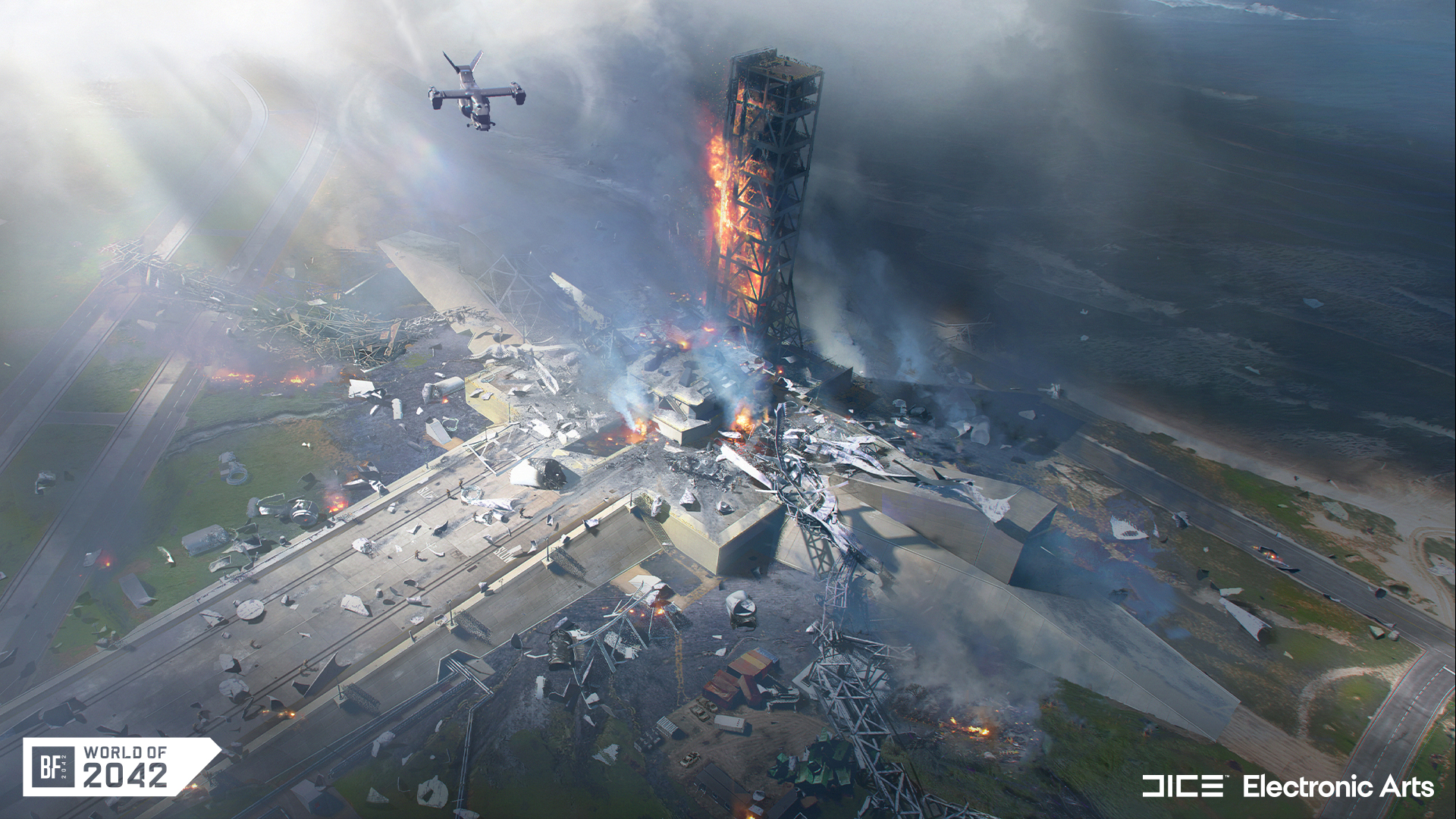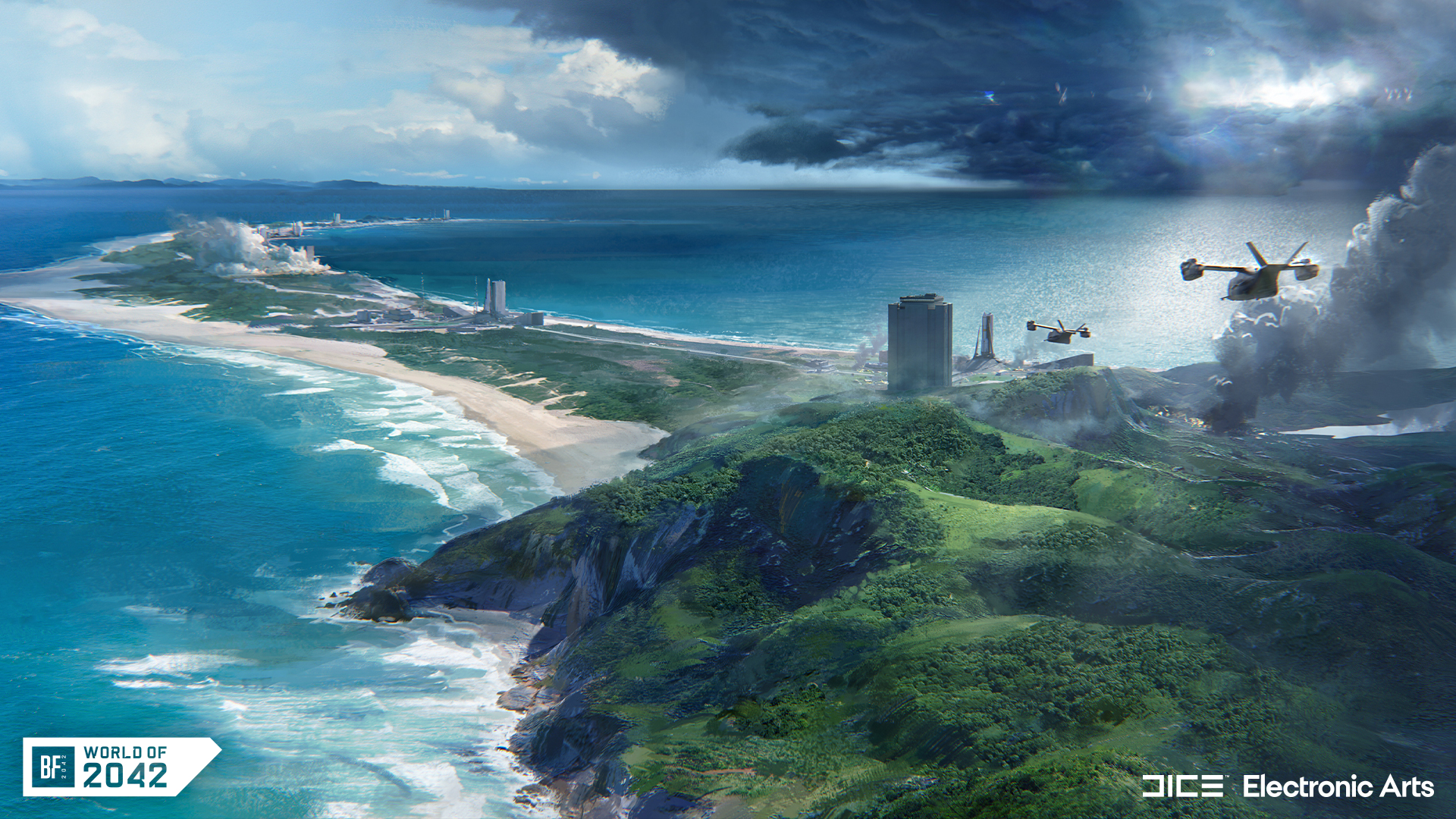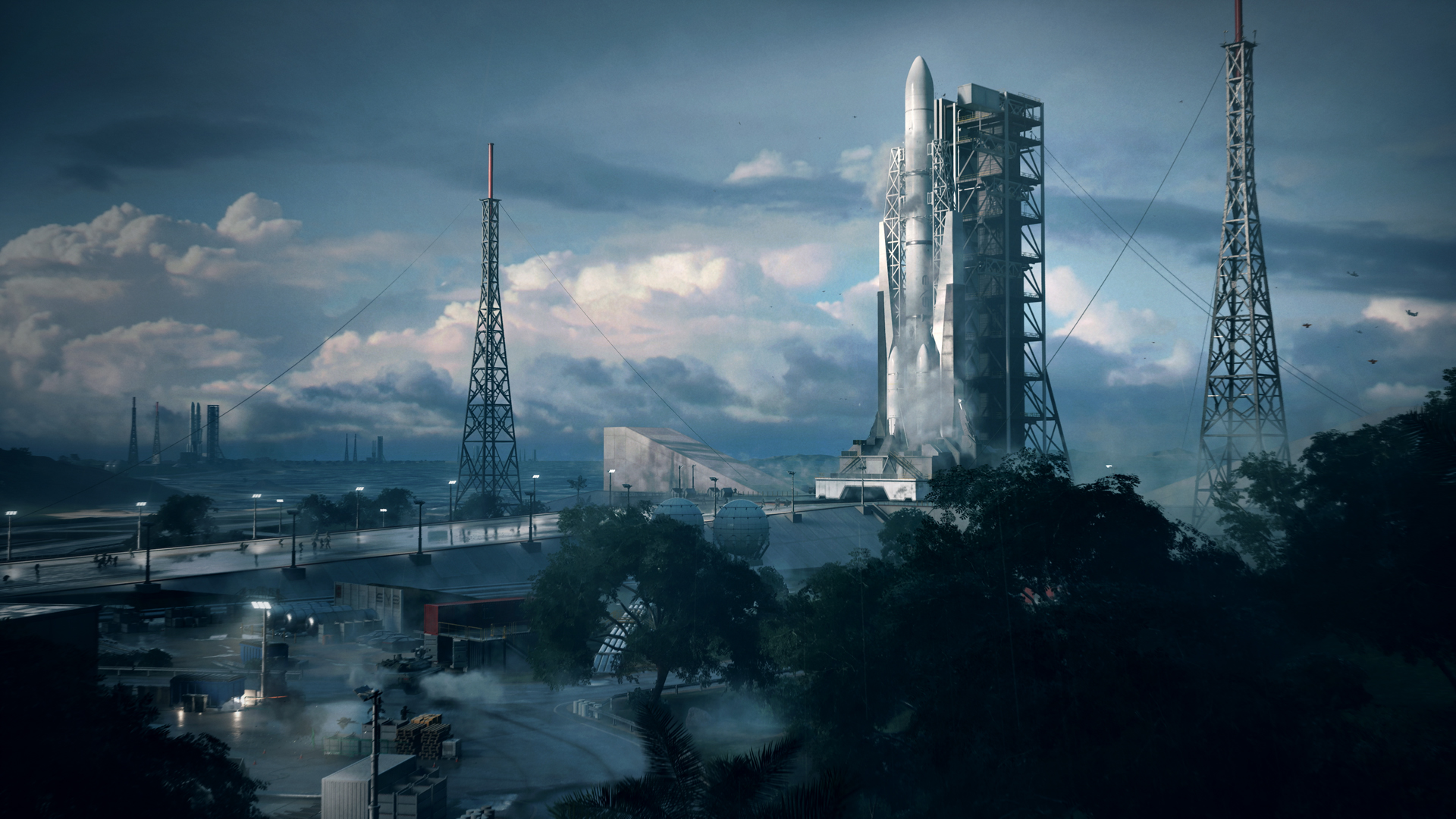
Battlefield players will forgive a lot, particularly when it comes to large scale maps and player counts. I'm not saying that in the abstract; I'm one of those players and have been since 2005, back when the Battlefield 2: Modern Combat multiplayer servers came online for PlayStation 2. And we'll forgive even more for spectacle, the kind that only DICE knows how to channel through massive multiplayer arenas, and that Battlefield 2042 achieves with ease.
Because how can you complain when you're marching across open land, willing your Specialist to sprint just a little faster after mistakenly spawning back at the HQ, only for two battling fighter jets to whoosh overhead, perilously close to the ground. As you're stuck scaling a staircase with a sniper in hand only for an ATV to whip past you and over the railing, careening into the cockpit of an encroaching, now-exploding helicopter. When you're stuck wondering which sector to head to next, wishing the game would communicate something, anything, about the tenor of the skirmishes unfurling around you, only to find your field of vision littered with the debris of a rocketship that failed its launch sequencing. As a friendly runs into crossfire between a hundred embattled players to pin a wheezing defibrillator to your chest, reviving you just in time to see your entire party pulled into the eye of a twisting tornado. When the Battlefield 2042 open beta clicks into place there are no complaints, only jubilation.
All out warfare
The Battlefield 2042 open beta is full of the sort of moments that only Battlefield has been able to historically deliver. Organic, cinematic events that force you to involuntarily exclaim "holy shit, did anybody else see that?" as you frantically jab at the 'capture' button to claim the clip for prosperity. The Battlefield 2042 open beta is also full of the other sort of only-in-Battlefield-moments. The ones that have made the series so meme-friendly in the modern era. Getting killed by players floating in low-orbit, disappearing into sections of scenery after mantling something you shouldn't, vehicles spinning wildly out of control after impacting scenery at speed, games blighted by server disconnects, and problems with matchmaking. For veterans of the open betas that played in advance of Battlefields 1, 4, and 5 it all feels reassuringly familiar.
DICE was quick to assure us that this build is a couple of months old now in a post-game Q&A, with the studio bemused to see bugs it squashed weeks ago back on screen as it watches our multiplayer sessions unfold. The studio promises that while this open beta is representative of the final product, the release build – now set for November 19, 2021 following a delay – will benefit from an extensive, studio-wide focus on weapon balance, polishing of handling, graphics, and audio, and a fine-tuning of the collision detection systems and player visibility.
While I do have some concerns that Battlefield 2042 isn't going to be the wide-spanning evolution that so many of us hoped it would be, particularly after a generation's worth of lackluster entries to the series, it's doing enough right that it has left me eager to see more of it. The shift to 128 players from 64 for PC, PS5, and Xbox Series X is seismic – destined to be the standout, defining feature of this new era of Battlefield. These large-scale battles feel like the natural iteration for a series that bet so heavily on scale and spectacle at its inception two decades ago.

Less successful, at least from the three hours I played the Battlefield 2042 open beta, are the changes made to the Conquest game mode. To help account for the larger-scale battles, DICE has adjusted its approach to map design in an effort to better corral players into clusters of the map, and keep the pacing varied as squads of four do their best to contribute to the capture of a Sector. I understand what the studio is shooting for here. DICE wants infantry units to congregate en masse around the rocket launch site and the four Sectors that encompass it – spanning the Assembly Building, Launch Platform, and a Crawlerway that connects the two. Meanwhile, aerial combat takes place beyond the clouds above, all while vehicles scrap it out in the outlying, sprawling rural areas that offer longer sightlines and little in the way of cover. When Battlefield's combat flow works as intended, there's nothing quite like it out there right now.
In practice, you'll see aerial vehicles being a nuisance at the Assembly Building, snipers crawling all over the Launch Platform (I need to see more of the Specialists before I make a judgment on Battlefield 2042's shift away from distinct classes, but MacKay's Grapple Gun speciality comes in useful here), ground vehicles just dominating the Crawlerway and any of the buildings that sit adjacent to it. Meanwhile, much of the outlying areas can feel a little empty. The Cryogenic Plant, Security Checkpoint, and Radar Station could make for nice little skirmishes, but players aren't given much reason to leave the immediacy of action offered by the spaces within direct sightline of the rocket.
Weekly digests, tales from the communities you love, and more
There's also a risk to leaving the central area, where it's suddenly very easy to find yourself walking for long stretches of time with little to no engagement along the way, only to be sniped before you can even spot the lens glare. This is a problem inherent to pretty much every traditional multiplayer shooter that has attempted to scale beyond the limitations of any given generation. Be it Black Hawk Down on the original Xbox as it pushed the player count to 50 (a record for consoles at the time), MAG with its caustic 256 player battles on PS3, or what PlanetSide 2 has done since with its thousand-player skirmishes since. The scale of Battlefield 2042 is certainly impressive, particularly so when you consider the level of polish and balance DICE is striving for, but it's telling that Battlefield has yet to solve long-standing pacing issues within maps that are sprawling as a necessity.
Race against time

Part of the problem may be Orbital. It's a medium-sized map that DICE says "is designed as the ultimate playground for vehicles, air and infantry" but in reality is fairly bland and uninteresting. The rocket loses its lustre quickly, particularly as the levolution itself doesn't seem as impactful as the standouts from Battlefield Hardline. Meanwhile, the map itself really isn't impacted all that significantly by the scale of the conflict unfurling around you, with destruction barely advancing beyond my memory of what Bad Company 2 was able to achieve a decade ago. Given that you can spend 30 minutes on these maps in a single session, the popular engagement spaces quickly begin to feel a little flat.
The other, much larger problem is that I found that Battlefield 2042 does a pretty poor job of communicating where you and your squad could best be utilized. It's constantly flashing banners across the top of the screen indicating that Sectors are being lost, but it doesn't necessarily work to then point you in the right direction; with 128 players on the map, slowing down to mess around with the map ensures an easy death. I'm not saying I want Battlefield 2042 to hold my hand, but a little direction would certainly be appreciated. Particularly in those situations where your friends aren't online and you're stuck playing with random players who aren't playing the objective, using voice chat to communicate points of order, or working as a squad to use team-focused equipment, Specialities, and Traits.
"I had a lot of fun with the open beta and I can't wait to see Battlefield 2042's other maps"
The way Battlefield 2042 communicates information broadly is something I'd like to see shored up ahead of the final game. It isn't easy to spot downed friendlies in the middle of firefights, for example, leading to few players actively working to pick teammates up off the ground, and that's in spite of healing abilities being released from the grasp of Medics and made freely available across the pool of available Specialists. Collision detection and weapon feedback feel a little loose too, not in a way that should worry you necessarily – Battlefield has always lagged behind its peers in this regard – but with so many players running around, stronger communication on where bullets are coming from and whether your own are registering would be appreciated.
If it sounds like that's a lot of complaining I want you to know that it comes from a good place. The PS4 and Xbox One generation was a little rough for the series – it got off to a bad start with Battlefield 4, before taking ill-advised trips back in time for Battlefield 1 and Battlefield 5 – and Battlefield 2042 represents an opportunity for DICE to hit the reset button. This is a chance for the studio to recapture the chaos of Battlefield 2, Bad Company 2, and Battlefield 3, and present a package of best-in-class visual, audio, and multiplayer design.
I had a lot of fun with the Battlefield 2042 open beta and I can't wait to see the game's other maps, particularly its denser urban environments that will offer more vertically and immediacy to engagements. And like I said before, all that complaining goes away when you and your squad are bunkered down defending an objective against a literal sea of enemy players and, just as all seems lost, you hear the rotary blades of a transport plane overhead and the sound of parachutes popping shortly thereafter. The open beta has shown that Battlefield 2042 is clearly delivering scale and spectacle on another level, I just hope there's enough depth behind the glamour to support it in the years ahead.

Josh West is the Editor-in-Chief of GamesRadar+. He has over 15 years experience in online and print journalism, and holds a BA (Hons) in Journalism and Feature Writing. Prior to starting his current position, Josh has served as GR+'s Features Editor and Deputy Editor of games™ magazine, and has freelanced for numerous publications including 3D Artist, Edge magazine, iCreate, Metal Hammer, Play, Retro Gamer, and SFX. Additionally, he has appeared on the BBC and ITV to provide expert comment, written for Scholastic books, edited a book for Hachette, and worked as the Assistant Producer of the Future Games Show. In his spare time, Josh likes to play bass guitar and video games. Years ago, he was in a few movies and TV shows that you've definitely seen but will never be able to spot him in.


